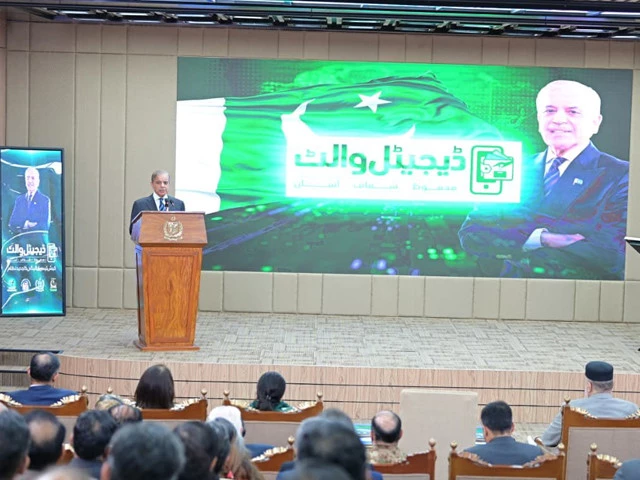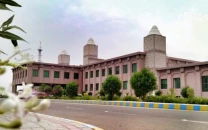PM launches 10 million digital wallets for BISP beneficiaries
Shehbaz Sharif describes move as historic milestone, calling it 'great leap towards cashless economy'

Prime Minister Shehbaz Sharif on Monday launched 10 million digital wallets for Benazir Income Support Programme (BISP) beneficiaries, describing the move as a “historic milestone” in Pakistan’s push towards transparency, financial inclusion, and a cashless economy.
With a symbolic palm touch, the prime minister inaugurated the system in the presence of federal ministers, BISP officials, and international partners, including GIZ, Radio Pakistan reported.
He congratulated BISP Chairperson Senator Rubina Khalid and partner institutions for the “landmark decision that will safeguard genuine recipients and protect them from undue difficulties.”
Prime Minister Muhammad Shehbaz Sharif launches the Digital Wallet System by BISP. pic.twitter.com/Sz2ntAjTG4
— Government of Pakistan (@GovtofPakistan) August 25, 2025
“The digital wallet system is in its true sense blessed by the soul of Shaheed Mohtarma Benazir Bhutto, as it empowers BISP beneficiaries with safe, transparent, and direct access to financial assistance,” PM Shehbaz said.
He described BISP as a “great initiative for poverty alleviation and employment generation,” stressing that further efforts were needed to expand its impact.
The prime minister termed the launch “a great leap towards a cashless economy” and recalled that during Ramazan, 78 percent of the relief package was successfully disbursed digitally despite scepticism and resistance from vested interests.
“Cashless transactions are the pressing requirement of our times. They save time, end corruption, and bring efficiency, helping Pakistan progress rapidly,” he said.
PM Shehbaz added that he had personally chaired multiple meetings on digitisation despite initial “indifferent attitudes and boredom” and stressed his commitment to transforming government, business, and personal transactions into digital channels.
He urged BISP leadership to link support with education and health conditionalities. “If a family is receiving assistance, it should be linked with the condition that all children of that household attend school. Similarly, health initiatives must be tied with BISP support. Only then will this programme become a true legacy benefiting millions of children,” he said.
Premier also called for reducing the current eight to ten-month implementation cycle to four months and paid tribute to stakeholders including the State Bank of Pakistan, the IT Ministry, local banks, and development partners. “We are not just disbursing aid, we are raising an army of architects and workers to build the nation,” he added.
براہِ راست: وزیراعظم کا ڈیجیٹل والٹس کے قیام اور مفت موبائل سمز کی فراہمی کے اجراء کی تقریب سے خطاب https://t.co/TC1DjPwNXD
— Government of Pakistan (@GovtofPakistan) August 25, 2025
Earlier, BISP Federal Secretary Amir Ali Ahmed said a high-level committee had been formed to ensure transparency and ease of access. “After today’s launch, 10 million digital wallets will be developed using beneficiaries’ CNICs, supported by a biometric verification system to prevent identity theft,” he said.
He added that 10 million free SIM cards would also be distributed, with the first phase underway in Hyderabad, Sukkur, and Rahim Yar Khan.
BISP Chairperson Senator Rubina Khalid called the launch an “important and historic milestone” and said the programme supporting over 10 million families was “not just financial assistance, it is a pathway to social and economic empowerment.”
She noted that linking benefits to women’s CNICs gave them recognition in the national database and said the new wallets would be complemented by digital literacy programmes for women unfamiliar with technology.
Senator Rubina highlighted that BISP continued the vision of Shaheed Benazir Bhutto for women’s empowerment, carried forward by President Asif Ali Zardari and now “excelling further under Prime Minister Shehbaz Sharif’s leadership.”
PM Shehbaz has repeatedly stressed the importance of a cashless, digital economy. Last week, in a meeting, he said the government is prioritising efforts to digitise Pakistan’s economy and shift financial transactions to a cashless system.
While chairing a review meeting on the cashless economy in Islamabad, he directed provincial chief secretaries to cooperate fully with the federal government in expanding the Raast digital payment system to the district level.
Read More: PM Shehbaz prioritises shift to cashless economy
Sharif expressed satisfaction with the progress made toward a cashless economy and the development of digital financial systems.
Officials briefed the meeting that Pakistan will build digital public infrastructure to provide every citizen with a digital ID, integrating national identity cards, biometrics, and mobile numbers. These IDs will enable secure and efficient payments.
The briefing added that provincial governments have made progress in linking government-to-public and public-to-government payments with the Raast system.
Authorities further informed the meeting that federal development agencies have granted right of way for fibre connectivity, while discussions with Pakistan Railways and the National Highway Authority are under way to expand digital infrastructure.























COMMENTS (1)
Comments are moderated and generally will be posted if they are on-topic and not abusive.
For more information, please see our Comments FAQ